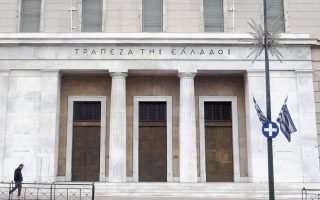Former comrade spoils party for Greek leftist leader

Weeks after toppling Alexis Tsipras's government, Greek far-left leader Panayiotis Lafazanis is landing fresh blows against his former comrade: stealing away voters and usurping the mantle of Greece's foremost anti-bailout champion.
A bearded, bespectacled former Communist whose fiery rhetoric belies his avuncular looks, Lafazanis has long been a headache for Tsipras. He regularly defied his former boss as energy minister and then led a rebellion in his SYRIZA party, forcing Tsipras to call snap elections on Sept. 20.
Now Lafazanis's barely three-week-old "Popular Unity" party of far-left rebels who broke away from SYRIZA has emerged as the wild card in the election, wooing former SYRIZA voters by reminding them that Tsipras capitulated to foreign creditors and accepted a bailout package he promised never to sign up to.
Hitting the campaign trail with pledges to end austerity for good, restore wages and pensions to pre-crisis levels and cancel the 86-billion-euro bailout, 63-year-old Lafazanis sounds a lot like Tsipras did before storming to power in January.
He's not a man to mince words: European Union and International Monetary Fund lenders are "imperialists", the privatization agency is "sinful," the bailout "neocolonial submission" and Greece is now a "Euro-Atlantic plot."
"They are destroying Greece and unfortunately every new bailout only aggravates this destruction," Lafazanis told Reuters. "Just stop this disaster now – stop blackmailing and putting pressure on Greece to implement bailouts of austerity and a selloff of the country. This a clear dead end not only for Greece but for Europe as a whole."
Unlike Tsipras, however, Lafazanis says he's ready to take Greece out of the euro and back to a national currency – marking him out as far too radical in the eyes of many Greeks.
But polls show the loss of SYRIZA's far-left flank is costing Tsipras dearly, both in terms of votes and the party's identity as a group that cherishes leftist ideals over power.
Between disillusionment over Tsipras's abrupt bailout U-turn and the lure of Lafazanis, SYRIZA is now locked in a dead heat with the conservatives in opinion polls – a far cry from the easy victory it was eyeing. Polls show it with 23-29 percent of the vote, well below the level needed for an outright win.
Taking away core voters
Popular Unity, meanwhile, is expected to take 3.5-5 percent of the vote and enter parliament, even though the fledgling party is just 20 days old, cobbled together in a day after Tsipras abruptly announced he was calling snap elections.
"Any loss is a problem (for SYRIZA) at this stage," ALCO polling agency chief Costas Panagopoulos said.
"For SYRIZA, Popular Unity's presence creates a problem not only in terms of numbers – its arguments remind voters of SYRIZA's past commitments and this intensifies the problem."
Popular Unity has stolen about 8 percent of Greeks who voted for SYRIZA in January when elections were last held, he said. That share may be small but represents SYRIZA's core leftist base that supported the party through the years, he said.
"It targets the core of the voters who believe that the bailout is a disaster and who have no problem with the adoption of a national currency," Panagopoulous said.
Still, openly calling for a return to the drachma puts the party against the path preferred by most Greeks – polls consistently show a majority favor staying in the euro.
Costas Lapavitsas, an economics professor and former SYRIZA lawmaker who rebelled and joined Popular Unity, dismisses such polls as "worthless" and says Greeks have never been clearly asked in a referendum if they want to stay in the euro or not.
He points out 62 percent of Greeks voted against the bailout in a July 5 referendum even though the opposition made it clear a 'No' vote was tantamount to leaving the euro.
"Ask them the real question: do you want the euro with the bailout conditions because that's what the euro goes with or do you want an alternative strategy, an anti-bailout strategy, with your own national currency?" he told Reuters.
He argues the anti-bailout sentiment remains strong in Greece, and that Greeks are increasingly asking him how a transition to a new currency would work.
The party is trying to openly tackle the issue head on. Its first TV advertisement takes tongue-in-cheek aim at reports over the summer that Lafazanis hatched a plot to seize the national mint, take over its reserves and force it to print the national currency.
The campaign spot shows Lafazanis hailing a cab and asking to be taken to the national mint, prompting a double take from the driver. Lafazanis smiles knowingly and then sombrely urges Greeks to find out the party's plans for themselves rather than believe the claims of rivals.
The party has not outlined how a transition to the drachma would take place, but Lafazanis has said that it could be as easy as "drinking a glass of water."
Lapavitsas, the professor, acknowledges that Popular Unity has a long road ahead and its work cut out to win public trust.
"People are very hesitant, they don't want the bailout but they trusted SYRIZA not so long ago and SYRIZA sold them down the river," he says. "And when that happens once, you don't trust someone else immediately, especially if that someone else was formed just a few weeks ago. Whether we manage to express the anti-bailout feeling very much depends on us."
[Reuters]





